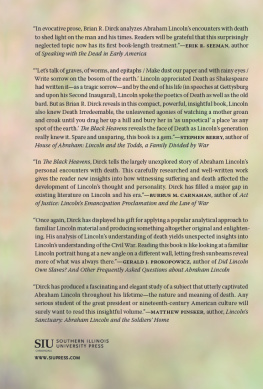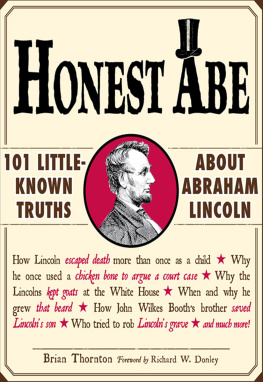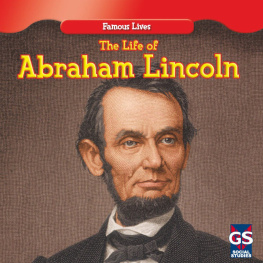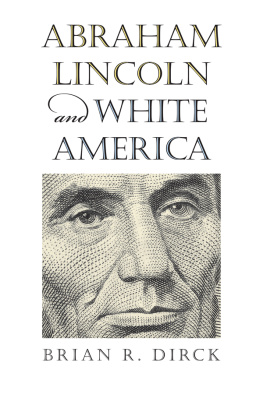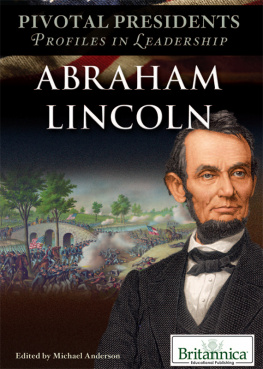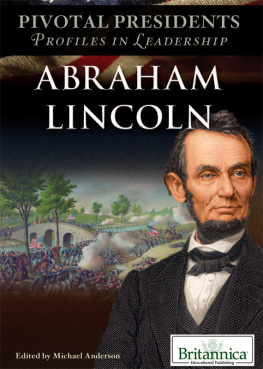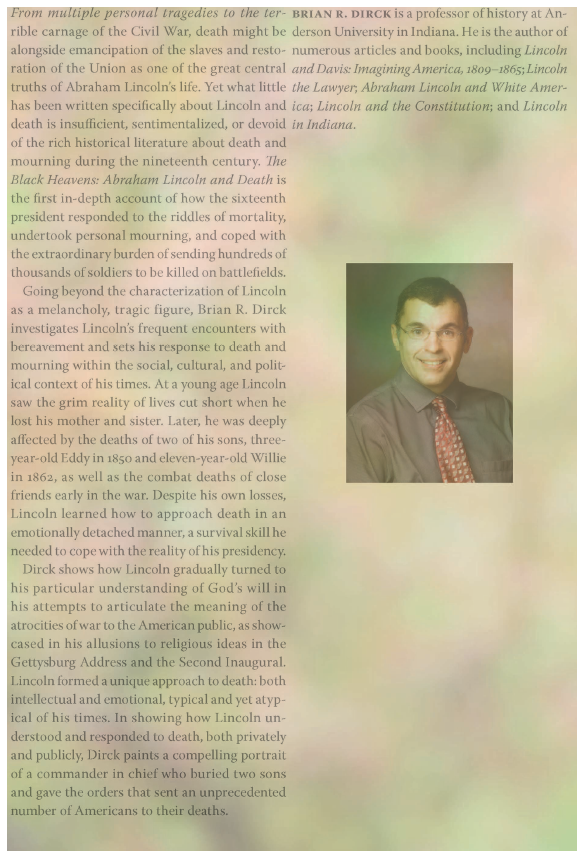Title: The black haven : Abraham Lincoln and death / Brian R. Dirck.
Description: Carbondale : Southern Illinois University Press, 2019. | Includes bibliographical references and index.
Identifiers: LCCN 2018019234 | ISBN 9780809337026 (cloth; alk.paper) | ISBN 9780809337033 (e-book)
Subjects: LCSH: Lincoln, Abraham, 1809-1865Political and social views. | Lincoln, Abraham, 18091865Religion. Lincoln, Abraham, 18091865Psychology. | DeathSocial aspectsUnited StatesHistory19th century.| DeathUnited StatesPsychological aspectsHistory19th century.
Printed on recycled paper. 
This paper meets the requirements of ANSI/NISO Z39.48-1992 (Permanence of Paper) 
ACKNOWLEDGMENTS
A book about death and mourning must necessarily bring to mind the loss of Phil Paludan, my mentor, advisor, and friend, an outstanding Lincoln and Civil War historian whom I still miss a great deal. How he carried himself as a scholar exercises a tremendous ongoing influence on me, and I hope I have been at least somewhat worthy of his example.
I must also profusely thank my editor at Southern Illinois University Press, Sylvia Frank Rodrigue. This was not an easy book to write or (Im sure) edit, and Sylvia displayed her usual sense of humor, extraordinary patience, and care in helping me see it through to fruition. Both Sylvia and the rest of the very able staff at the press did heroic work in editing and preparing this project for publication. I would also like to express my deep gratitude to the anonymous peer reviewers who offered their excellent observations and saved me from numerous pitfalls and errors. I of course am solely responsible for any errors that remain.
I have been blessed with a congenial professional environment at Anderson University, where I have had the honor to teach for the last twenty years. My colleagues Dan Allen, Michael Frank, David Murphy, Abigail Post, Jaye Rogers, and Joel Shrock are actually more than that; they are valued friends. Our department secretary, Jan Bell, has also been of tremendous help, both in preparing this manuscript and in other professional matters. And I thank all my students, who have enriched my life in uncountable ways. I learn from them at least as much as they learn from me.
My father and my children have been, as always, forthcoming with their love and support, listening with admirable patience to my ramblings about my latest book project. This has probably been a more taxing matter than usual, given the dark subject matter contained in what they dubbed the death book. I am grateful for their forbearance. I want to thank Lavada for her support, as well as the occasional little push. I would also like to thank my friend and colleague Kris McCusker, professor of history at Middle Tennessee State University, who read early portions of the manuscript and offered valuable input.
In October 2013, we received the news that my mother had been diagnosed with stage 4 breast cancer. Her prospects were dim from the outset, and her suffering was painful for me and my family to watch. Yet for over a year she fought the disease with a forthrightness and bravery that impressed all who knew her. She passed away in February 2015, while I was in the process of writing this book. As a rule, historians are unwilling to admit that personal circumstances play a role in their research and writing: the past for the pasts sake, or so goes the saying. Yet honesty compels me to admit that my mothers lengthy illness and passing away played a role in how I approached the subject of Lincoln and death, though just how is not altogether clear, even to me. But I am certain that the experience of watching her difficult final months is in these pages. How could it be otherwise? I would like to think that in the end, this has not been a bad thing. My experience with my mothers death helped me better understand Lincolns various experiences in this regard; or at least I hope so.
INTRODUCTION: PHILADELPHIA, JUNE 16, 1864
I suppose that this toast was intended to open the way for me to say something. People laughed. They would not have been altogether surprised that President Lincoln opened his speech with a little joke. By now, during what would be the wars last summer, they knew what to expect.
Accounts differ regarding who delivered the toast, either John Welsh, a prominent member of Philadelphias charitable community, or Thomas H. Webster, a businessman and philanthropist who had founded a school for the education and training of African American soldiers. The banquet attracted many such dignitaries, including Edward Everett, the distinguished former governor of Massachusetts and president of Harvard, who eight months previously, along with Lincoln, had spoken at the dedication of Gettysburgs new cemetery. Many others were prominent members of the Sanitary Commission, the Norths leading civilian private relief organization. The Sanitary Commission had organized the banquet as part of a fair that stretched through buildings covering all of Logan Square in downtown Philadelphia, mixing fund-raising, patriotic ceremonies, and laudatory pronouncements on the commissions good works.
One newspaperman thought the fair offered a respite from the wars gloom. It was some compensation for the dreadful scenes of our conflict, he wrote. The war... has not, to us Philadelphians, seemed so palpably present, nor its horrors so lurid, since the Fair opened. The flag-bedecked buildings, the expressions of support for the army and the cause, and above all, the fact that the Sanitary Commission was dedicated not to violence and death, but rather to alleviation of the wars sufferingsproviding comfort and medical care to the soldiers at the frontmade it seem as if the commission had smoothed down the sharper points of grim visage war, and taught us that even where battle rages, there the kind and far-reaching charity of our Fair are felt.
Perhaps. Yet reminders of that deadly time persisted. In the vast main hall, where Lincoln stood to respond to his banquet toast, muskets, swords, pistols, bayonets, and other weaponry mixed with the festive sea of red, white, and blue flags, streamers, and bunting. The correspondent found the overall effect charming, but however benevolent the fairs purpose, everyone knew that a war lurked behind the festivities.
Lincoln knew. Men were dying, and he was squarely in the middle of it all. The day Lincoln arrived in Philadelphia, George Cutter, a Union soldier from Lawrence, Massachusetts, was killed in the trenches before Petersburg, Virginia. A snipers bullet or cannon shot? The available records do not say. A Pennsylvania private named F. Roudenbush (the rolls do not give his full first name) also died that day, from wounds he had received nearly two weeks earlier at the Battle of Cold Harbor. Another private, Newton Dutcher from New Jersey, was mortally wounded at a little firefight in Pine Knob, Georgia; he would expire three weeks later. The death rolls were now so long.

